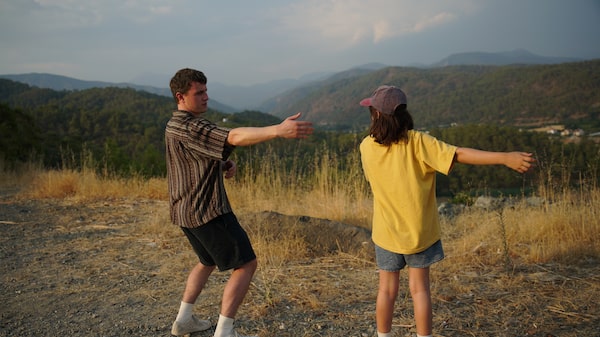
Aftersun is a story of small moments, as the viewer watches an 11-year-old Sophie (Frankie Corio) hang out with Calum (Paul Mescal), who is so young as to be constantly mistaken for her brother rather than parent.Courtesy of A24
- Aftersun
- Written and directed by Charlotte Wells
- Starring Paul Mescal and Frankie Corio
- Classification R; 96 minutes
- Opens in select theatres Oct. 28
Critic’s Pick
There are films that don’t hit – that don’t truly deliver their intended wallop – until your time with them is almost done.
Aftersun, the debut feature from Scottish filmmaker Charlotte Wells, patiently develops itself without urgency or worry, confidently building a series of half-formed memories into something steady, something real, over the course of a highly atmospheric but largely plotless hour and a half. But when the film’s final moments do arrive – in a perfectly edited scene that is soundtracked to a warped version of Queen and David Bowie’s Under Pressure, of all the overused songs in the world – Aftersun cuts you in two with such emotional intensity, such impressive dramatic force, that I could only sit and fight back the inevitable tears.
A memory play that delights in actually playing with memory, Aftersun is bookended by the thirtysomething Sophie (Celia Rowlson-Hall) revisiting old camcorder footage of the summer vacation that she took with her father Calum back in the late 1990s. The adult Sophie is searching for something – confirmation, denial, absolution? – about her father, though Wells keeps the truth appreciatively vague. Mostly, this is a story of small moments, as we watch an 11-year-old Sophie (Frankie Corio) hang out with Calum (Paul Mescal), who is so young as to be constantly mistaken for her brother rather than parent.

Sophie and her father's relationship isn’t strained, but it's marked by an acute distance as we learn that she lives with her mother.Courtesy of A24
The pair’s relationship isn’t strained, though it is marked by an acute distance. Through asides of dialogue and half-overheard phone calls back home, we learn that Sophie lives with her mother, that Calum still retains an affection (though not necessarily a romantic one) for the mother of his child, and that this sunny escape to a cheap Turkish resort is an unusually grand gesture for the cash-strapped father. As the pair hang out by the pool, sip on an endless stream of faux-tropical drinks, endure the evening “entertainment” put on by the hotel staff, and pick and prod at one another’s histories, Wells produces a carefully measured, lyrical portrait of a bond that is both natural and unconventional.
Stepping outside the main action every so often to dip into the digitization of the trip – with certain camcorder-caught moments played and then replayed by the adult Sophie in her quest to decipher … something – Wells slips in just enough ambiguities to startle. Calum sports a plaster cast on his right arm, but cannot or will not tell Sophie how he acquired the injury. And what about the moments in which Calum sequesters himself away on their hotel room’s balcony, dancing to some unheard tune? Sophie, and the audience, are left to untangle these moments with an innocent curiosity that becomes engrossing, addictive.
Everything in Aftersun feels calibrated just so, from the embarrassingly on-point 90s period details – finally, a filmmaker has found the courage to use the music of Canadian hip-hop collective Bran Van 3000 onscreen – to the passably shabby grounds of Sophie and Calum’s vacation property, perfect for unambitious holidaymakers who want adventure without the risk of genuine foreignness.
The sincerity, nostalgia and whiffs of familial mystery are all held together by two perfect little performances. Corio, a newcomer who feels plucked straight out of Wells’s imagination, is achingly pure as Sophie, a girl on the verge of rebellious adolescence who, at least for now, desires nothing more than to be tethered to this man who she only fractionally knows.

As Calum (Paul Mescal) alternates between watching over his daughter and fighting some kind of inner battle, Mescal delicately balances a protectionary parental instinct with profound inner heartache.Courtesy of A24
Mescal, meanwhile, continues to make good on the promise he displayed in his breakthrough role when he starred in the 2020 television adaptation of Sally Rooney’s Normal People. As Calum alternates between watching over Sophie and fighting some kind of inner battle that Wells only fleetingly defines, Mescal delicately balances a protectionary parental instinct with profound inner heartache. (This is also, coincidentally but neatly, Mescal’s second run in as many years playing a lost soul adrift in a janky European vacation locale, after his supporting turn in The Lost Daughter.)
As wonderful as the two actors are, though, even their tremendous work cannot quite prepare you for the gut punch that comes in Aftersun’s final few seconds. If I can offer a warning that is also a recommendation: Wells has made a film so devastating that you will thank her for breaking your heart in half.
 Barry Hertz
Barry Hertz